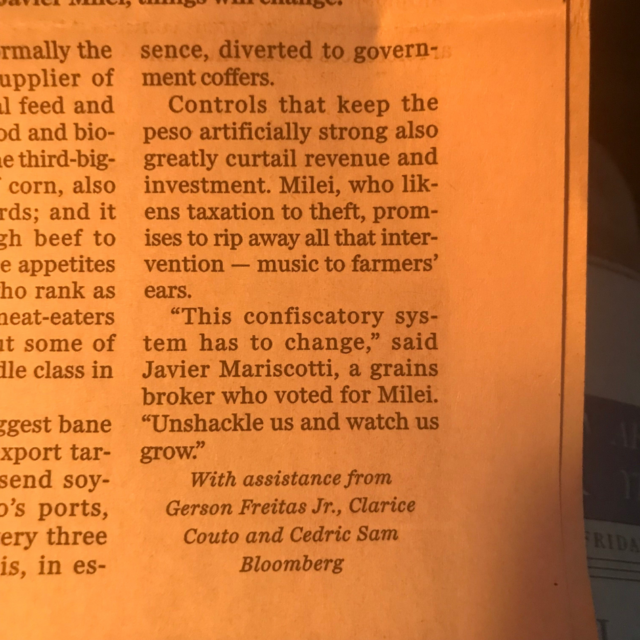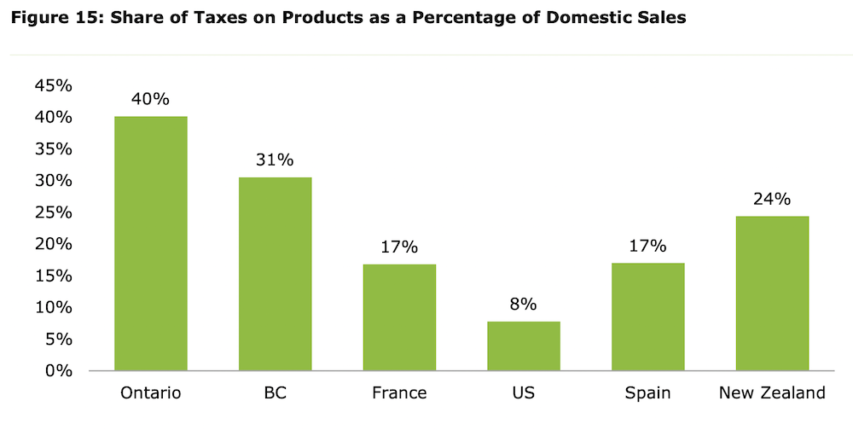Elizabeth Nickson wonders if you can feel the Earth shaking in your area:
Did you hear the roar on the streets when Milei won Argentina? It built and built, and then everyone was out on the streets shouting, from windows, inside shops, houses. It is the future, all over the world. The Netherlands on Friday. Same same. Universal rejoicing.
Absurdistan does a solid line in doom, but our firmly held first principle is that every single one of us should be two or three times as rich, with massively increased scope and ability to do the things we want to do. Defeating the criminal cartel that runs Big Pharma, Big Ag, Big Government, Big Tech and Big Charity will light up the galaxy if not the universe. And … this. Especially this:
Unlike almost everyone in the media, Absurdistan knows regulation is the principal reason we are hornswoggled serfs. Even Trump’s team was surprised at the economic boom that came from his mild de-regulation; they thought tax relief was the key. It was important, none of us should be paying more than 25% in taxes, if that, but the regulation! You have no earthly idea how fiendish it has become until you start a business or require permission to create anything in the material world. Few journalists ever do that, the most they do is join a bank in “communications”, design an app or website, do PR, or “consult”. They are virtually, to a man or woman, children in the real world. So no one reports on the most brutal crippler of every man, woman and child on earth. Equally, virtually no writer I read has any grasp on the ingenuity, the creativity, the strength of the ordinary man. They all seem to think we need guidance from them, which is laughable. They have screwed up everything so utterly, we teeter daily on the edge of fiscal catastrophe.
When Vivek Ramaswamy proposed instantly firing 50% of federal bureaucrats on Day One, I stood on my office chair and cheered.
When Javier Milei tore strips of paper representing government ministries off the whiteboard, I had to go out and run around the house a few times.
Africa is not limited by anything but confiscatory corrupt government, as asserted by Magatte Wade in her new book. Wade should be running things in Africa, which is polluted by commies, plutocrats, crooked multinationals, ravening bureaucrats, corrupt politicians and the brutalist green movement. The Chinese would stun the world if they could get rid of the vicious predatory communist regime that enslaves every man, woman and child. And not in the sense that they are “taking over”.
The mop-up will take decades. But unpicking the bad regs and shooing the bad legislators off to permanent exile, prosecuting the army of government thieves, and creating a multi-polar world, will be more absorbing than our endless self-cherishing, self-indulgence. Have we not all shopped enough? We have powerful enemies, but they are fully aware of how destructive they have been, their guilt written on their exhausted pouchy faces.
Trump is a symptom, not a cause
People fighting the Borg wish for leaders but this is not a movement that requires leadership by anyone but each and every one of us. Trump is a symptom, not a cause. This is multi-headed, like Medusa, representing tens, hundreds of millions of individuals saying NO. Real politicians like Mike Johnson, Geert Wilders, Pierre Poilievre, Javier Milei, and Danielle Smith are listening to us and stepping up.









